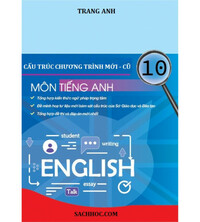Đề kiểm tra giữa kì 1 tiếng Anh lớp 10 có đáp án
Nằm trong bộ đề kiểm tra giữa kì 1 lớp 10 môn Anh năm 2022 - 2023, Đề thi tiếng Anh 10 giữa học kì 1 chương trình mới có đáp án dưới đây tổng hợp nhiều dạng bài tập tiếng Anh lớp 10 chương trình mới khác nhau giúp các em ôn tập những kỹ năng tiếng Anh cơ bản.
I. Find the word which has a different sound in the part underlined.
| 1. A. take | B. family | C. grateful | D. table |
| 2. A. nursing | B. nurture | C. turn | D. future |
| 3. A. society | B. sociable | C. groceries | D. finance |
II. Choose the word which has a different stress pattern from the others.
| 4. A. breadwinner | B. homemaker | C. washing-up | D. equally |
| 5. A. routine | B. laundry | C. household | D. finance |
III. Choose the best answer A, B, C or D to complete the sentences.
6. Do you have to do __________?
A. the mess
B. your bed
C. the washing-up
D. the cook
7. Do you have to ______ the rubbish out?.
A. take
B. make
C. empty
D. do
8. My mother ______ the responsibility for running the household.
A. holds
B. takes
C. runs
D. bears
9. We share the house with our grandparents and our uncle’s family. It is a(n) _________ family
A. nuclear
B. extended
C. crowded
D. multi-generation
10. Are you free on Sunday evening? I’d like to ________ to the cinema?
A. ask you
B. ask out you
C. ask you out
D. ask you away
11. My mother is very good at ________her time between work and family.
A. leaving
B. splitting
C. sharing
D. taking
12. When a couple can _______ chores in a way that both spouses feel satisfied with the outcome, they are showing mutual respect for one another.
A. cut
B. run
C. take
D. divide
13. The children, all three, have done _________, mopped, dusted, helped on the house and in the yard.
A. laundry
B. clothes
C. groceries
D. rubbish
14. Our parents _______ hands to provide for the family and make it happy.
A. were joining
B. are always joining
C. join
D. joins
15. My grandparents ______ with my family at present and my grandmother _______ me how to cook several traditional Vietnamese dishes.
A. stay - instructs
B. stay - is instructing
C. are staying - instructs
D. are staying - is instructing
IV. Fill in each blank with the correct word/phrase from the box.
breadwinner heavy lifting iron chores responsibilities
share nurture homemaker groceries laundry
16. If your partner has agreed to buy the _______, you might plan the week’s meals and make the shopping list.
17. We should pay attention to the conditions that _________ and strengthen early childhood development and health across the life course.
18. Past studies have shown that couples who ______household chores report feeling happier overall.
19. Couples who share ________ at home are happier overall.
20. It takes a housewife a lot of time to _______clothes for the household.
21. I have watched my husband and children take over much of my role as a ___________.
22. The husband replaces the light bulbs while the wife does the __________.
23. Nowadays in nuclear families, homemaker and __________ roles have evolved into something that makes it impossible to define exactly.
24. Many couples find that they look at the division of __________ differently .
25. Men and boys do most of the ________ in the family.
V. Choose the word or phrase among A, B, C or D that best tits the blank space in the following passage.
Working Mothers
In the United States today, more than half of mothers with young children work, compared to about one third (26)______ 1970s. Women have been moving into the workforce not only for career (27)______ but also for the income.
In many families today, mothers continue to work because they have careers that they have spent years (28)______ . Some women (29)______ to work soon after (30) ______birth because they know that most employers are not sympathetic to working mothers who wish to take time off to be with their young children.
Some people still think that a “good mother” is one who (31)______ work to stay home with her children. However, no scientific evidence says children are harmed when their mothers work. A child who is emotionally well adjusted, well loved, and well cared for will thrive regardless of (32) ______the mother works outside the home.
In most families with working mothers, each person (33)______ a more active role in the household. The children tend to (34)______ one another and help in other ways. The father as a (35)______ is more likely to help with household chores and child rearing. These positive outcomes are most likely when the working mother feels valued and supported by family, friends, and coworkers.
| 26. A. in | B. in the | C. at | D. at the |
| 27. A. enjoy | B. satisfy | C. satisfaction | D. pleasant |
| 28. A. develop | B. to develop | C. developing | D. developed |
| 29. A. return | B. turn | C. happen again | D. exchange |
| 30. A. producing | B. making | C. taking | D. giving |
| 31. A. gives up | B. stop | C. end | D. puts up |
| 32. A. where | B. when | C. how | D. whether |
| 33. A. plays | B. does | C. makes | D. takes |
| 34. A. look at | B. look after | C. look for | D. look up |
| 35. A. bread | B. breadwinning | C. breadstick | D. breadwinner |
VI. Read the passage, and choose the correct answer A, B, C or D for each question.
Home Life in Japan
It is common in Japan for three generations to live under the same roof. This is becoming less common today, but still exists, certainly in the countryside.
Husbands in Japan give their salaries to their wives. They are returned a sum of money as pocket money, otherwise how to use the rest is the wife's decision. The finances of a family are the responsibility of the women who handle most of the household expenses. There are exceptions in instances when something of value, like a car, is being bought. This is changing with more women going to work.
Japanese fathers in contemporary urban households spend so much time at work, and the company demands on them are so great. It means that they often really have very little time or energy to spend with their children. The responsibility for raising children, overseeing the education fall onto the mothers. Mothers play an enormous role in the lives of their children and the bond is very strong. Babysitters are rarely used and mothers often sleep with their babies. A mother will also spend hours with children doing school work. Few Japanese men help with housework. There is more pressure today for this to change.
Most families in Japan today are nuclear families, such as those in the United States. That is to say that a married couple lives together with their children, perhaps with one grandparent. But for the most part, the Japanese family today looks much like the American family.
36. In Japan, extended families are still popular _______________.
A. in big cities
B. in the countryside
C. everywhere
D. in urban areas
37. A Japanese woman is responsible for all of these EXCEPT __________.
A. raising children
B. handle household expenses
C. making decisions on very valuable things
D. taking care of children's school work
38. Japanese fathers in contemporary urban households _________________.
A. are under great pressure of work
B. are responsible for most household chores
C. handle most of the household expenses
D. stay at home to work as babysitters
39. Nowadays there is a pressure that men should ______________.
A. earn more money
B. help their wives with housework
C. leave important decisions to their wives
D. work harder at work
40. Most families in Japan nowadays may be _______________.
A. extended families
B. three-generation families
C. the same as the traditional ones
D. similar to those in the Western
VII. Rewrite these following sentences as directed
41. Mrs. Quyen taught the mute but she doesn't do it any more. (used to)
→........................................................................................................................
42. I am pleased to meet you again.
→ I look forward ................................................................................................
43. I have watched that movie. ( the passive voice)
→ .........................................................................................................................
44. Mary could not go to school because she was sick.
→ Because of …...................................................................................................
45. Sheila couldn’t come to the party. This was a pity. (“which” as connector)
→..........................................................................................................................
46. She said to me: "I can’t do it by myself"
→ She told me that..................................................................................................
Đáp án đề thi tiếng Anh giữa học kì 1 lớp 10
I. Find the word which has a different sound in the part underlined.
1 - B; 2 - D; 3 - B;
II. Choose the word which has a different stress pattern from the others.
4 - C; 5 - A;
III. Choose the best answer A, B, C or D to complete the sentences.
6 - C; 7 - C; 8 - B; 9 - B; 10 - C;
11 - B; 12 - D; 13 - A; 14 - C; 15 - D;
IV. Fill in each blank with the correct word/phrase from the box.
16 - groceries; 17 - nurture; 18 - share;19 - chores; 20 - iron;
21 - homemaker; 22- laundry; 23 - breadwinner; 24 - responsibilities; 25 - heavy lifting;
V. Choose the word or phrase among A, B, C or D that best tits the blank space in the following passage.
26 - B; 27 - C; 28 - C; 29 - A; 30 - D;
31 - A; 32 - D; 33 - A; 34 - B; 35 - D;
VI. Read the passage, and choose the correct answer A, B, C or D for each question.
36 - B; 37 - C; 38 - A; 39 - B; 40 - D;
VII. Rewrite these following sentences as directed
41. Mrs. Quyen taught the mute but she doesn't do it any more. (used to)
→.............Mrs. Quyen used to teach the mute..........................
42. I am pleased to meet you again.
→ I look forward ...........to meeting you again........................................
43. I have watched that movie. ( the passive voice)
→ .........That movie has been watched by me.........................
44. Mary could not go to school because she was sick.
→ Because of …...........being sick, Mary could not go to school...................
45. Sheila couldn’t come to the party. This was a pity. (“which” as connector)
→.......Sheila couldn’t come to the party, which was a pity.........
46. She said to me: "I can’t do it by myself"
→ She told me that..................... she couldn’t do it by herself....................
Download đề thi và đáp án tại: Đề thi tiếng Anh giữa kì 1 lớp 10 có đáp án. Mời bạn đọc tham khảo thêm nhiều tài liệu ôn tập Tiếng Anh 10 cả năm khác như: Để học tốt Tiếng Anh lớp 10, Đề thi học kì 1 lớp 10, Đề thi học kì 2 lớp 10, Bài tập Tiếng Anh lớp 10 theo từng Unit trực tuyến,.... được cập nhật liên tục trên Tìm Đáp Án.







